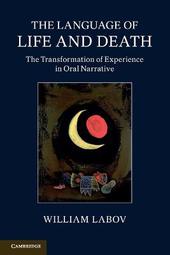
|
The Language of Life and Death: The Transformation of Experience in Oral Narrative
Paperback / softback
Main Details
| Title |
The Language of Life and Death: The Transformation of Experience in Oral Narrative
|
| Authors and Contributors |
By (author) William Labov
|
| Physical Properties |
| Format:Paperback / softback | | Pages:248 | | Dimensions(mm): Height 226,Width 151 |
|
| Category/Genre | Sociolinguistics
Semantics
Literary studies - general |
|---|
| ISBN/Barcode |
9781107656819
|
| Classifications | Dewey:306.44 |
|---|
| Audience | | Tertiary Education (US: College) | |
|---|
| Illustrations |
2 Line drawings, unspecified
|
|
Publishing Details |
| Publisher |
Cambridge University Press
|
| Imprint |
Cambridge University Press
|
| Publication Date |
1 August 2013 |
| Publication Country |
United Kingdom
|
Description
We share the experience of others through the stories they tell of the crucial events in their lives. This book provides a rich range of narratives that grip the reader's attention together with an analysis of how it is done. While remaining true to the facts, narrators use linguistic devices to present themselves in the best possible light and change the listener's perception of who is to blame for what has occurred. William Labov extends his widely used framework for narrative analysis to matters of greatest human concern: the danger of death, violence, premonitions and large-scale community conflicts. The book also examines traditional epic and historical texts, from Herodotus and the Old Testament to Macaulay, showing how these literary genres draw upon the techniques of personal narratives. Not only relevant to students of narratology, discourse and sociolinguistics, this book will be rewarding reading for anyone interested in the human condition.
Author Biography
William Labov is Professor of Linguistics at the University of Pennsylvania.
Reviews'Erudite, thoughtful and personal, an engaging book to be read and pondered, as much for the fundamental issues raised and the fascinating data analyzed as for the solutions offered.' Neal R. Norrick, Saarland University 'Labov's vision of our human desire to make sense of the most terrible and terrifying of our experiences is remarkable, panoramic, and a poignant tribute to the value of listening to each other keenly.' Alyssa McCabe, Journal of Sociolinguistics
|